Post-lockdown Italy is a soccer match begging for live audience
“If we reopen, they will come”.
One sentence summary: nobody knows what will happen, but it must happen, and some things reported here in the past weeks and months are happening.
The exceptionalism of Lombardy is confirmed, but what does it mean?
As I already complained, figures like “Deaths per country” are the biggest, most misleading error all main media worldwide keep making. Other numbers are much more meaningful, albeit what they really mean is still hard to grasp. As of May 8th, for example, according to the table below from this article, Lombardy had 1469 COVID19 deaths per million inhabitants, versus 305 for the rest of Italy, which is more than US (235) but less of Sweden without lockdown (314):
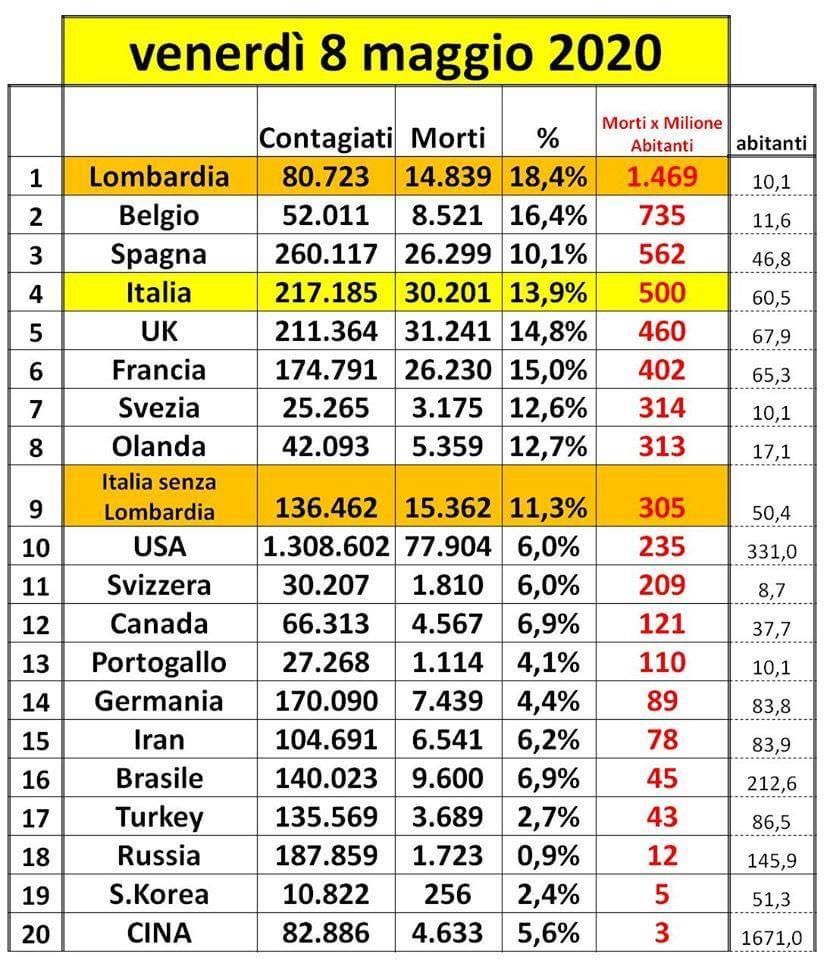
The red colum is deaths per million inhabitants. Italy without Lombardy is ninth.
</em></u>
The “performance” of Lombardy would be due, says the article, to:
- Too many people accepted in hospitals, without adequate protection for staff and other patients
- Long-term care clinics for seniors using little or zero protection (e.g. allowing relatives to continue visits), while receiving patients that hospitals dismissed to not spread contagions themselves
- No “total lockdown” in any town after the initial one in Codogno
- No regional policy for systematic tracking and immediate testing, even when the situation was dramatic
This cannot be the whole story.
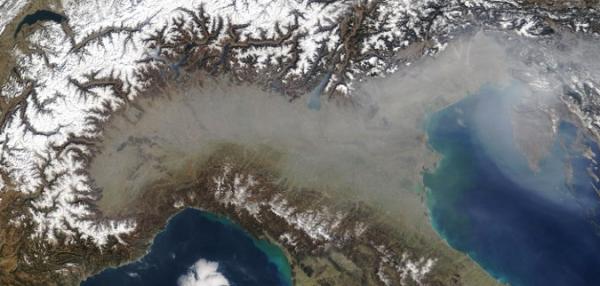
<u><em><strong>CAPTION:</strong>
<a href="https://www.thelocal.it/20190228/po-valley-air-pollution-italy" target="_blank">Air pollution over Lombardy and the rest of Po Valley, one year BEFORE COVID19.</a>
</em></u>
Besides health privatization, that pushed the causes above, the specific kind of high air pollution of the Po Valley, or the Calvinist-like work ethic of the Bergamo province, and other factors surely played some role.
More inequality coming
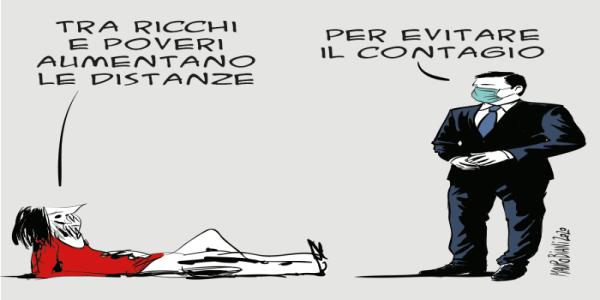
L= Distance between poors and richs increases... R: It's to avoid contagion.
</em></u>
Italian car dealers pray. Theoretically, this could be their finest hour, thanks to public transit that must operate at highly reduced capacity and car sharing heavily out of favour. On the other, they must still pray that the 350K cars, now idling unsold in their showrooms, will find enough buyers with enough money to take that stock (see “Quadrant 1 below).
Beach delirium continues. “10 square meters per beach umbrella, 1.5 meters between beach loungers”. This is what should happen on beaches that normally are like this:
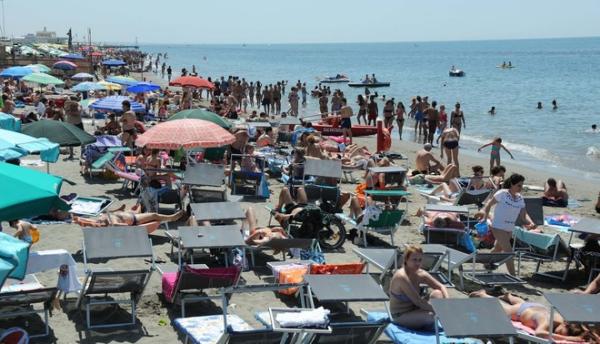
<u><em><strong>CAPTION:</strong>
<a href="https://www.ilmessaggero.it/fotogallery/roma/ostia_pienone_spiagge_migliaia_mare-3772043.html#&gid=3772043&pid=14" target="_blank">Click for pre-COVID19 beaches near Rome</a>
</em></u>
Even in Liguria, the narrowest italian region:
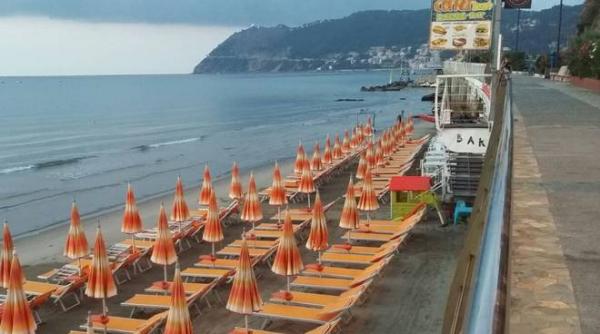
What will actually happen, of course, is what I already described weeks ago, here and here: people with plenty of cash will get the sweetest car deals of the decade, and a place on some privatized beach. Everybody else will struggle more, to move less than before. Private beaches will make money, public ones will have to be closed and booked, to avoid fights or contagions.
Daily life from lockdown to phase “2”
Eighteen people of four different families tested positive in Rome yesterday, after attending a funeral
Confusion abounds, and media sometimes increase it, as with this “explanation” of the distancing rules for restaurants:
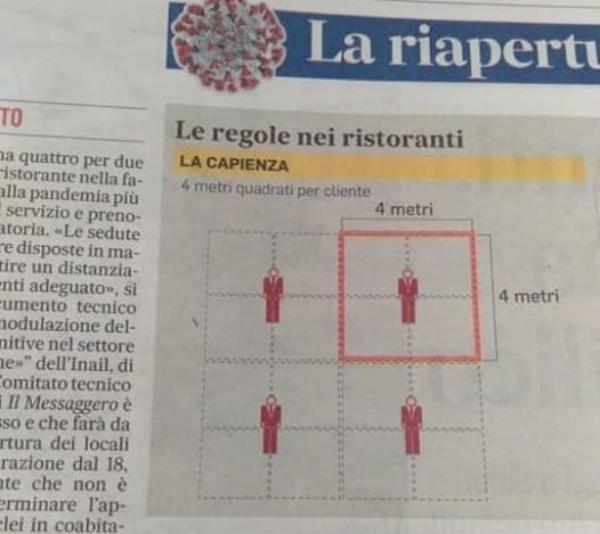
4 sq meters, or 16?
</em></u>
The text below the yellow stripe says “4 sq meters per customer”. But each customer is inside a square of 4x4 meters, that is 16 sq. meters, not 4. Clear, huh?
Lockdown saves money! In these two months, the average Italian has saved 185 Euro per month more than before, and something similar is happening in the US. Of course, those “savings” can mean everything, from medical exams postponed, to not buying gas for commuting.
Soccer may improve. Back in March I wrote about the beneficial effect that coronavirus may have on that plague of Italy that is soccer “tifo”. Now, some studies suggest that playing like this, in empty stadiums:
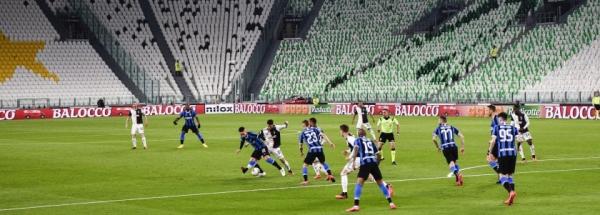
Italian soccer match, autumn 2020: all game, no (mad) public.
</em></u>
may also yeld less stress for players and referees, that is better and fairer matches.
Most small crime is down, as much as 50% less, except extorsions, in Foggia. That may be because COVID19 makes extorsion-related punishments easier, as I reported, still about Foggia, back in April.
Robocops wait for people returning to fly:
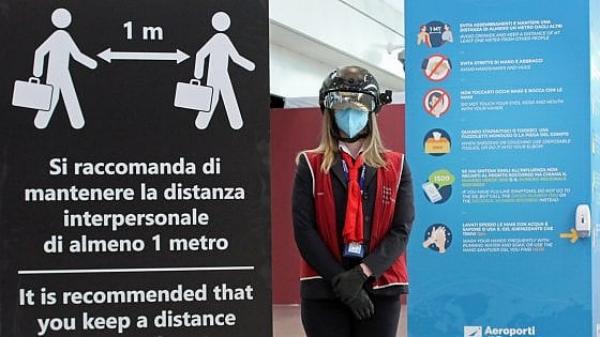
Airport security personnel wears “thermometer helmets” (video here) that show them the temperature of people as far as seven meters away. Some companies operating in Fiumicino just told their employees to install a mandatory app that will announce in real time any change in safety measures. The feeling that blood testing at the gate, before boarding any plane, becomes mandatory some time in the near future and stays mandatory doesn’t leave me.
Mass is back, at a distance. Parishes in Rome have announced that Masses can restart on May 18th, with a fixed limit to people inside the church at any moment, speakers outside for those left out, less Masses to allow sanitization between them, volunteer stewards orderly leading the faithful in and out buildings, Communion given with single-use gloves, mandatory masks, distanced seating, children only sitting with their parents.
Prison-related anti-COVID19 measures put extra pressure on the government. In early March, italian prisons revolted against COVID19 restrictions, and still remain virus bombs. The (sensible!) decision to protect 376 inmates in precarious health conditions by moving them to house arrest did not exclude several drug traffickers and Mafia bosses under restricted custody, including three worth of the top security “Article 41-bis prison regime”, who can now manage their own business “smart working” from home, like anybody else. Seeing the opportunity, even ex-terrorist Cesare Battisti has requested house arrest for the same reason. At the moment, the government is looking for a legal way to make exception to its previous actions.
Theathers and other public venues prepare for bankrupt. 30% of restaurants will not reopen on May 18th because they would lose even more money by operating at lower capacity, with heavy remodeling expenses, worries of people like me (see below), and no aid money seen yet. Theathers of all sorts may reopen in June, but “in safe conditions”, which should mean: e-tickets only, mandatory booking and masks, seats at least one meter apart, temperature checks at the entrance, seats at least one meter apart, for a maximum capacity of 200 people indoor (staff included!!!) and 1000 outdoor.
Many people see no leisure in COVID19-compliant “leisure” time. I, and several of my relatives, decided weeks ago that we will avoid beaches this summer period, regardless of prices. Ditto for restaurants, and many other “experiences”. We are sorry for (some) jobs we will endanger even more, but no, thanks. Going through all the stress of booking a safe place maybe weeks in advance, for a day that may be rainy, to stay there as (self-) controlled as guinea pigs just doesn’t feel like “leisure”. We will get used to that, eventually, but if we are talking of 2020… Regular early morning strolls in some city park, or a hike in the hills have a much higher “relax-to-stress” ratio, and if that makes GDP sad, that’s just too bad. For more on this, see the “quadrant” below.
Artists who can do it, take to the streets. Musician Andrea Casta, stand up comedian Antonio Giuliani and others are taking a traveling tour titled “Sotto lo Stesso Cielo” (“Everybody under the same sky”):
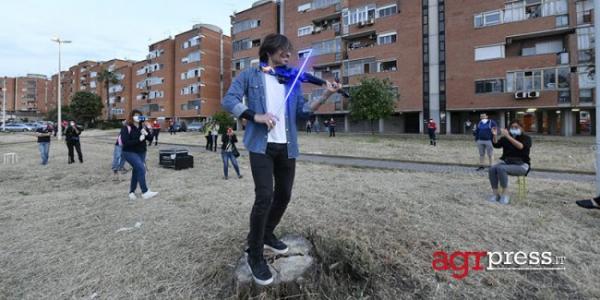
in the courtyards or parking lots of some of the biggest popular residential complexes in Rome, including the notorious “Corviale”, a single apartment building 1 km long (video here).
Weather forecasts are less reliable because planes and ships that don’t move don’t even collect essential meteorological data.
A uselessly dangerous “maturity exam” is coming.
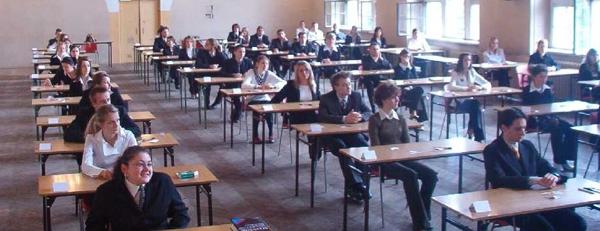
The final high school exam (“maturity exam”) is a big deal in Italy, that involves about 400K students every year, all in the same few days decreed by the government. This year, for obvious reasons, the exam will have a much simpler, ready to happen online format: a 1-hour long interview, without written tests. However, unless the situation worsens again, these 400K students will meet their exam commissions in person. The Minister of Instruction (38 years old) pushed for this outcome because, among other things that exam “was the best moment of my life”. Now, should anybody whose happiest moment in 38 years of life has been… the high school exam, be allowed anywhere close to state politics? As interesting as that question is, it is less urgent than asking how sensible it is to spend ~39 million Euros to add one more, but avoidable health risk to the picture.
Nobody makes it easier for ALL italians to work, and it’s a real shame. Government and opposition have played good and bad cop for weeks over whether migrants should be given temporary blanket visas to harvest the fields that are already starting to fill with rotten produce. As far as I can tell, in all this Role Playing Game, nobody except Lega (in a few local administrations) has promoted concrete initiatives to help unemployed Italians to get such jobs, and nobody at all has taken concrete steps to make the same jobs legally accessible to furloughed Italians, as I reported twenty days ago.
What should the “over 60” do? I must apologize for not covering before one of the potentially most important issues discussed here in Italy since the outbreak started. A couple of weeks ago, the head of the “Phase 2” task force proposed to exhonerate from work, during Phase 2, everybody more than 60 years old, and thus more vulnerable to the virus. This means millions of Italians out of their workplaces until at least October.
PM Conte refused, but maybe the main defect of that proposal is that it wasn’t bold enough. If the task force had had the courage to propose mandatory, state-funded retirement for, say, that huge majority of over-60 workers who don’t have an essential job and the government the courage to implement it:
- millions of people may have decreased the public level of infection, or done something more urgent than bulls**t jobs, taking preventive care of themselves
- but above all, this may have stimulated the whole country to recover much better than any conventional stimulus package.
The number of public or private organizations that would be forced, or free, to reinvent themselves in more competitive or more meaningful ways by a sudden workforce change like this would be huge. It would innovate Italy for real, where and how it really needs it, more than a thousand Silicon Valleys, or a million startups. And I have collected proofs for two months now that the worst thing Italy may do to recover from COVID19 would be to become again the Italy of 2019 (assuming it could ever be possible now, which is far from sure).
Italy, summer 2020: a game with closed doors?
Let’s look again at this picture:

Soccer match, or COUNTRY match?
</em></u>
It is interesting because those players in that empty stadium are a perfect metaphore of all of Italy right now. That stadium and those players are doing exactly the same thing that all the italian restaurants, hotels, pubs, beauty salon and hundreds other categories are doing right now: just reopen with rules never seen before, with no people at all in sight, hoping that “if we reopen, they will come”. The only problem is that soccer may survive even with people “coming” only via TV, the others couldn’t.
Right now, the situation of Italy is a combination of two macro-bets. One is that nothing will go wrong or, in politicians minds, that “nothing I may be charged for will go wrong”. Between the lines, all the hundreds of plans, policies and announcements of the last two weeks say little more than this: nobody knows what will happen, everybody in charge sincerely hopes for the best of the country, and is working very hard towards that goal, and towards not being personally blamed for anything that may go wrong.
The government decree with all post-lockdown, Phase 2 policies, was announced as “April decree” around April 25th and received the evergreen, much less committing name of “Restart Decree” right after May 1st. But as of May 15th was nowhere official to be seen, just like the official “contact tracing” app. This evening, after weeks of frantic negotiations and “total” opening just a few hours away, it seems that decree has reached a form that all Regions could sign… except Campania, that protests because “it is not acceptable that the government offloads everything to Regions”. Committing to an end date for a lockdown before you know what to do next is not a wise idea.
The other macro-bet is that enough Italians (as well as foreigners and companies, of course) are not like me. Consider this quadrant, that has “no money” and “money to spare” on one axis” and “relax, versus stress to achieve it” on the other:
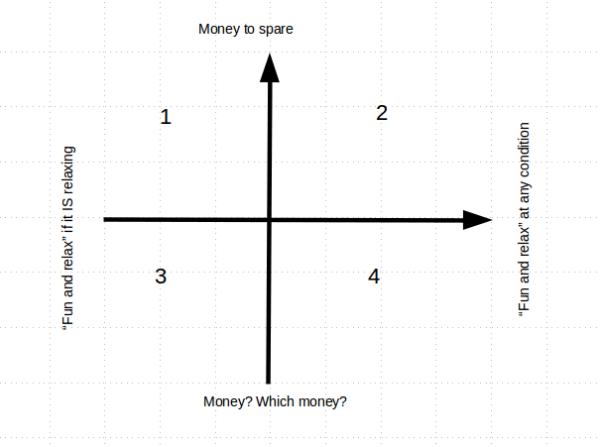
Personally, as I explained with beaches, I tend to be in the left side of that diagram, struggling to be in its upper quadrant: regardless of money, I won’t engage in many leisure activities with economic value if they are as stressful as they seem today, for several months. The second, unspoken macro-bet that everybody is doing, from PM Conte (not to mention Bruxelles) down to the last newspaper kiosk owner, is that there will be enough people (including foreigners, of course) in quadrant 2 of that picture to make the economy of yesteryear reappear.
Fact is, the number of Italians in Quadrant 2 of that figure only matters to a limited extent, because that diagram has another dimension: the amount of people who can spend in services the money they have, in such an unprecedented situation.
By now, there are separate guidelines for dentists, restaurants, gardeners, libraries, landscape maintenance, public offices, gyms, hairdressers, swimming pools, public transits etc… Each (stilll changing!) guideline details different opening hours, compliance rules, and extra checks that slow down activities.
Then there are the general guidelines on mobility, which will play the huge role I already described here, and the actual freedom of spending of families, which is unknown. The High Institute for Healthcare said two weeks ago “forget summer camps of any sort, it’s too risky”, only to be promptly told by the Minister for Families “no, let’s have those camps safely, because parents must go back to work”. Whatever that means, for example have kindergardens with multibple shifts. But multiple shifts for both parents and children, plus reduced mobility, make outings a mirage, emptying Quadrant 2 even more. Thanks heaven, absurdly complex policies like just paying one parent per family to stay home with the children during summer, aren’t getting any consideration.
But what nobody knows is the second order effects, that is how the mutual interaction of all those guidelines and factors will play out in reality, and what it will make of GDP.
Last but not least, there is the money that will be wasted to keep dinosaurs on life support until the next ordinary, that is “financial-only” crisis. The right thing to do may be to use stimulus packages for everything, except “RESUSCITATION of industries that need to die first, and then (maybe) be born again. Instead, we have 3 billion Euros (twice those assigned to schools) reserved to “restart” Alitalia for the Nth time in twenty years, instead of shutting it down for good, and starting a 100% new airline with a decent cost structure, no debts and a saner organization. Or the request to the State to guarantee a 6.3 billion loan to FIAT/FCA, that moved abroad to make more money by paying less taxes. All this, and much more, is happening to “return to 2019 normal” instead of “doing stuff that makes sense”.
You can support these COVID19 chronicles and all my other work via PayPal donations or in these other ways.
Who writes this, why, and how to help
I am Marco Fioretti, tech writer and aspiring polymath doing human-digital research and popularization.
I do it because YOUR civil rights and the quality of YOUR life depend every year more on how software is used AROUND you.
To this end, I have already shared more than a million words on this blog, without any paywall or user tracking, and am sharing the next million through a newsletter, also without any paywall.
The more direct support I get, the more I can continue to inform for free parents, teachers, decision makers, and everybody else who should know more stuff like this. You can support me with paid subscriptions to my newsletter, donations via PayPal (mfioretti@nexaima.net) or LiberaPay, or in any of the other ways listed here.THANKS for your support!